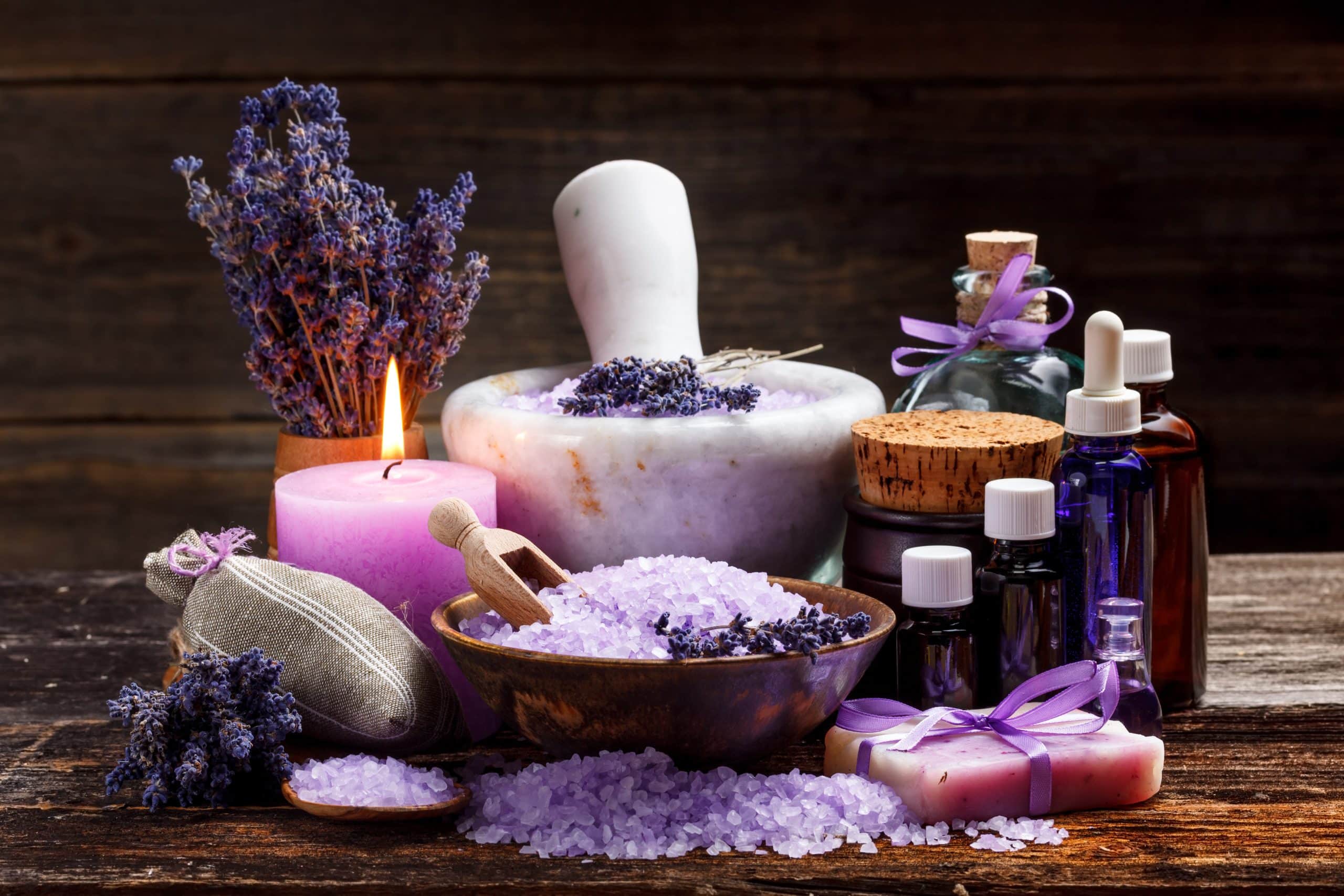Of the five senses, smell is often overlooked in favor of sight and sound. However, smell has been used for centuries to enhance physical and emotional wellness. Aromatherapy, also known as smell therapy, is a holistic healing treatment that uses natural plant extracts to promote health and well-being (1). Believers in smell therapy use candles, aroma sticks (incense), and oils to create a calming atmosphere in the home or work environment. Candles provide both scent and light, while incense and oils are most commonly used for their strong aromas. Each of these products has its own unique benefits; so let’s take a closer look at what they can do for you and the science (if any) behind them.
What Is Smell Therapy?
Smell therapy is a holistic healing technique that uses essential oils, herbs and other fragrances to alleviate physical and emotional ailments. It has been around for centuries, with many ancient cultures using aromatherapy to enhance healing.
The earliest documented use of smell therapy dates back to 3000 BC in Ancient Egypt, where they used fragrant plants such as frankincense and myrrh for healing. Another ancient culture, the Chinese, also used scent therapy to treat certain ailments.
In fact, they developed a system called Qi or “chi” which is based on the belief that your body and health are affected by your environment. According to this belief, scents can be used to balance and restore harmony in the body.
Fast forward to the modern age, and smell therapy is now a popular alternative medicine practice. There are many different types of aromatherapy, including massage with essential oils, inhalation of scented candles and sprays, and diffusing fragrant plants in an enclosed space.
Each one has its own unique benefits, and some benefits are actually backed by scientific research.
Read More: Explore The Wonders Of Massage Cupping Therapy: A Guide For Newbies
Does Smell Therapy Really Work?
Research into the efficacy of smell therapy is still ongoing, but some studies have suggested that it can be an effective form of alternative medicine. Note that most of these studies look into essential oils specifically, not other forms of smell therapy such as candles or incense.
Furthermore, most of these studies are yet to extend to clinical trials. What this means is that the evidence so far is inconclusive and more research is needed to determine if smell therapy really works or not.
That said, the existing evidence does suggest that smell therapy can be beneficial in the following ways:
Fight Inflammation
While inflammation is a normal response of the body to injury and other irritants, chronic inflammation can lead to a variety of conditions such as allergies and autoimmune disorders. Some research suggests that certain essential oils may help reduce inflammation (2).
According to a 2010 study, thyme, clove, and eucalyptus essential oils were found to be particularly effective at reducing inflammation. Thyme essential oil was found to be especially potent, reducing COX-2 expression (a marker of inflammation) in the colon by up to 75% (3).
Whether you’re a workout beast or just a beginner making your first foray into the world of fitness and dieting – BetterMe has a lot to offer to both newbies and experts! Install the app and experience the versatility first-hand!
Ease Symptoms Of Depression And Anxiety
Depression is a mood disorder that’s characterized by feelings of sadness, hopelessness and worthlessness. The exact cause of depression is unknown, but some research suggests that certain essential oils may be helpful in reducing symptoms.
That is, as a complementary therapy alongside traditional medications.According to studies into aromatherapy and depression, certain oils have an anxiolytic (anti-anxiety) effect (4). These include lavender, bergamot, rosemary and chamomile essential oils.
They work by calming the nervous system and inducing a feeling of relaxation. This increases the production of the neurotransmitter serotonin, a hormone responsible for feelings of happiness and well-being.
Antibacterial Properties
Essential oils are also known for their antibacterial properties (5). Research suggests that certain oils, such as tea tree and cinnamon, may be effective in killing bacteria and reducing infection. A 2009 study found that these essential oils were able to reduce the growth of E. coli and Staphylococcus aureus, two common bacteria.
Ease Pain
Pain is one of the most common reasons people seek out smell therapy. Essential oils may be able to provide relief from both chronic and acute pain (7). According to studies, rosemary and lavender essential oils have been found to be particularly effective in reducing pain.
They work by blocking the production of certain pain-causing enzymes in the body. Another study found that a blend of lavender, marjoram, peppermint and cypress essential oils was able to reduce pain in people with osteoarthritis (6).
Improve Mood
The theory is that when we breathe in essential oils, the molecules enter our bloodstream and travel to our brain (9). Here, they interact with various parts of the brain responsible for emotions and memory.
This helps to improve our mood and create a sense of calm. Studies have found that citrus essential oils, such as lemon and bergamot, are particularly good for lifting the mood. You might also want to try peppermint and eucalyptus essential oils which are said to have a stimulating effect.
Improve Sleep
Anxiety, pain, and stress can all interfere with our sleep. While essential oils cannot necessarily cure these conditions, they may be able to help improve the quality of your sleep by calming the mind and body.
According to studies, lavender essential oil is one of the most effective oils for promoting relaxation and aiding sleep (10). It works by calming the nervous system and reducing stress.
Read More: The Benefits Of Using Natural Soaps For Massage Therapy, And How To Choose The Right Product
Improve Concentration And Memory
Essential oils can also be beneficial for improving concentration and memory. Studies suggest that certain essential oils may help to increase alertness, reduce distraction and improve focus.
For example, rosemary oil has been found to increase the accuracy of recall.
Peppermint is another popular choice as it is said to have stimulating and uplifting properties that can help with mental clarity (8).
What Are The Types Of Smell Therapy?
There are many ways to take advantage of smell therapy. You can choose from a variety of methods depending on your needs and preferences, such as:
Scented Candles
Scented candles are a popular home décor item, and those with essential oils serve an added purpose – providing aromatherapy benefits. The advantage of using candles is that they are relatively safe and easy to use. You just need to light them and enjoy the aroma.
Aroma Sticks
Aroma sticks are hollow tubes filled with essential oil. They have a wick at one end that is lit, and the aroma spreads through the air. This is an effective way to enjoy aromatherapy, as the scent will last for hours. Note that these should only be used in well-ventilated areas.
Essential Oil Diffusers
Diffusers are a great way to disperse essential oils into your environment. They come in different shapes and sizes, from small hand-held units to large wall-mounted diffusers.
For the best results, it’s important to use the right combination of oils and to adjust the settings according to your needs.
One downside of diffusers is that you have to regularly refill them with water and oils. And if you don’t clean them regularly, they may become a source of bacteria.
Reed Diffusers
Reed diffusers are a type of aroma stick that doesn’t require any heat to release the essential oils. They have reeds that absorb the oils, which then disperse through the air. This is a simple and easy way to enjoy aromatherapy, as you don’t need to worry about refilling water or cleaning the diffusers. The downside is that they don’t last as long as other types of diffusers.
Dropping pounds by the dozens without putting yourself through the wringer is everyone’s weight loss pipe dream. But what if we told you that the BetterMe app can make that happen? Keep yourself in prime shape with our fat-blasting workouts, delicious budget-sparing recipes, and body-transforming challenges with our app!
Incense
Incense sticks are also a popular way to enjoy aromatherapy. They don’t require any electricity or heat, and they’re quite affordable. As with candles, you just need to light the stick and enjoy. However, incense may contain chemicals that could be harmful if inhaled in large amounts. So it’s important to use them in well-ventilated areas.
Are There Any Risks To Smell Therapy?
The safety of smell therapy relies on which type you choose and the quality of the product. Essential oils, for example, can be dangerous if not used correctly as they are highly concentrated plant extracts and may cause skin irritation or allergic reactions.
There is also a risk of toxic inhalation if they are not used properly, as essential oils can be harmful when inhaled in large doses. A good way to minimize these risks is to have a trained practitioner guide you in the use of aromatherapy.
They will be able to advise on the best products to use and make sure you apply them safely. Additionally, it is important to perform a patch test before using an essential oil on your skin to make sure you are not allergic to it.
Know the signs of an allergic reaction, such as a rash or difficulty breathing, and seek immediate medical attention if you experience any of these.
The Bottom Line
Smell therapy can be a great way to improve your mood and reduce stress levels. It can also provide many other health benefits, from aiding sleep to improving concentration and focus.
However, it’s important to take the necessary safety precautions and use products of good quality in order to get the most out of your aromatherapy experience.
Talk to a trained aromatherapist or medical professional if you’re unsure of which products to use and how to install and use them safely. With the right preparation, you’ll be able to enjoy the therapeutic benefits of smell therapy without any risk.
DISCLAIMER:
This article is intended for general informational purposes only and does not address individual circumstances. It is not a substitute for professional advice or help and should not be relied on to make decisions of any kind. Any action you take upon the information presented in this article is strictly at your own risk and responsibility!
SOURCES:
- Aromatherapy (2020, nih.gov)
- Antioxidant and Anti-Inflammatory Activities of Essential Oils: A Short Review (2010, nih.gov)
- A Focused Insight into Thyme: Biological, Chemical, and Therapeutic Properties of an Indigenous Mediterranean Herb (2022, nih.gov)
- A Systematic Review of the Anxiolytic-Like Effects of Essential Oils in Animal Models (2015, nih.gov)
- Essential Oils as Antimicrobial Agents—Myth or Real Alternative? (2019, nih.gov)
- Essential Oils and Bioactive Components against Arthritis: A Novel Perspective on Their Therapeutic Potential (2020, nih.gov)
- Efficacy of Essential Oils in Pain: A Systematic Review and Meta-Analysis of Preclinical Evidence (2021, nih.gov)
- Effects of Peppermint Essential Oil on Learning and Memory Ability in APP/PS1 Transgenic Mice (2022, nih.gov)
- Inhalation Aromatherapy via Brain-Targeted Nasal Delivery: Natural Volatiles or Essential Oils on Mood Disorders (2022, nih.gov)
- Lavender and the Nervous System (2013, nih.gov)















